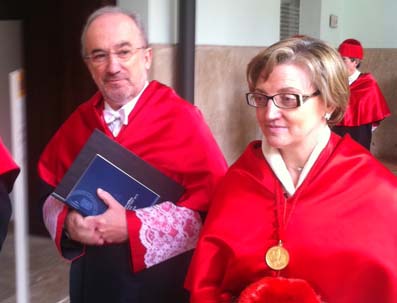
The renowned jurist Santiago Muñoz Machado said Thursday that "the elimination or reduction of social policies can directly affect human dignity." Muñoz Machado has lectured on poverty and the law, being doctorate "honoris causa" by the University of Valencia.Professor Juan Francisco Mestre has been in charge of reading the 'laudatio'.
Santiago Muñoz Machado has offered the historical evolution of legal standards directly related to poverty, and stopped especially in the Valencian humanist intellectual input of Joan Lluís Vives, author of fundamental texts on poverty.
The new honoris also recalled some figures on poverty in the world today, adding: "Not only poverty has not been eradicated, but it has become a global problem, considering the growing inequalities between ones and anothers countries on the earth. " In 2008, 22% of the world population lived on less than $ 1.25 per day, while 2,470 million people, 42% of the world population, living on less than $ 2 per day. In Spain, with data for 2011, 21.8% of all households were below 60% of median income and therefore in relative poverty.
The lawyer stated: "Given the persistence of the problem of poverty there musn't be room, however, for resignation." And he warned: "We must abandon the belief that the delimitation, content and scope of the action leading to the realization of social rights is essentially linked to the economic situation, so that it can be waived or reduced its performance based on content in times of crisis. I have not adjusted to this assertion by the values and principles enshrined in our Constitution, because the elimination or reduction of social policies can directly affect human dignity, which is a value in Article 10.1, to equality and achieving a more just and fair coexistence".
The full speech of Santiago Muñoz Machado can be found by clicking here.
In 'the laudatio', Juan Francisco Mestre, referred to Muñoz Machado linking with the University of Valencia, and also his teaching career and in advisory positions to the highest instance of the State.But Mestre has focused on the research work of the new 'honorary', from which he stressed "the great ability to identify, in each historical period, the relevant problems or issues affecting the reality and the social and legal questions, to place them in their particular stage and face their analysis and diagnosis, providing guidelines or criteria for interpretation solvents criteria, and always offering accurate results, which may take issue, but never lack a solid foundation, a rigorous reasoning or outcome solvent ".
Specifically, the research topics have been the territorial organization of power, the legal system of the European Union, and the law of economic regulation. And especially, of course, his "Treatise on Administrative Law and General Public Law", designed in five volumes, which have already seen the light of the first four, each of which takes place in over a thousand pages.
The 'laudatio' can be read by clicking here.
For his part, the president Esteban Morcillo has highlighted about the new 'honoris causa' "firm legal defense of the rights and social policy over the economic arguments so sadly common today, and his view that these principles, fighting poverty, one of the Millennium Development Goals, is a duty and a right enforceable in need anywhere in the world, all this gives us the dimension of its social commitment. "
The rector has used to remember "again, and right now", in the context of a severe economic crisis, "the importance of the public university system in the training of people in the generation and transfer of knowledge, science and culture, but also its decisive contribution to social cohesion by generating prosperity and welfare in a society of justice and solidarity. "
Rector's words can be found by clicking here.
Santiago Muñoz Machado (Pozoblanco, Córdoba, 1949) is Professor of Administrative Law at the Computense University of Madrid, and has been elected to the chair 'r' of the Royal Spanish Academy.Also Academician of the Royal Academy of Moral and Political Sciences. He is a member of the National Academy of Law and Social Sciences of Buenos Aires and the International Academy of Comparative Law.
After working for the Prime Minister for a few years, in his capacity as member of the Technical Corps of the Civil Administration of the State, he became by public exam first an assistant professor at the Complutense University, and then a tenure-track 2 professor and chair at the Faculties of Law of the University of Valencia and the University of Alcalá de Henares. He has also taught in various European and American universities.
He belongs to the editorial boards of several Spanish and foreign journals and directs the General Administrative Law Journal (electronic) and The Chronicle of Social and Democratic State of Law.
His legal work is composed of over forty books and hundreds of articles. His most influential studies include those relating to the Third Sector and social activity of the State, concerning the law of the Autonomous Communities and Law devoted to economic regulation. And his great book of synthesis, projected in five volumes of which four have so far been published (with a total of more than five thousand pages), titled 'Tratado de Derecho Administrativo y Derecho Público General', is the work of reference on the subject, both in Spain and in other countries.
Besides his strictly legal work, he is the author of books of short stories (Riofrio, 2010, with very wide distribution), historical research (El problema de la vertebración del Estado en España, 2006), biographical studies of historical character (Sepúlveda, cronista del Emperador, 2012) and essays on current issues (Informe sobre España: repensar el Estado o destruirlo, del que se han hecho tres ediciones entre noviembre y diciembre de 2011).
Last update: 7 de march de 2013 13:45.
News release



















